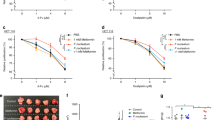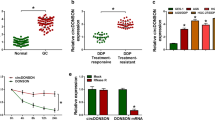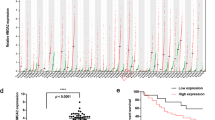Abstract
Cisplatin resistance is the main cause of colorectal cancer (CRC) treatment failure, and the cause has been reported to be related to Fusobacterium nucleatum (Fn) infection. In this study, we explored the role of Fn in regulating cisplatin resistance of CRC cells and its underlying mechanism involved. The mRNA and protein expressions were examined by qRT-PCR and western blot. Cell proliferation and cell apoptosis were assessed using CCK8 and flow cytometry assays, respectively. Dual-luciferase reporter gene assay was adopted to analyze the molecular interactions. Herein, our results revealed that Fn abundance and miR-135b expression were markedly elevated in CRC tissues, with a favorable association between the two. Moreover, Fn infection could increase miR-135b expression via a concentration-dependent manner, and it also enhanced cell proliferation but reduced apoptosis and cisplatin sensitivity by upregulating miR-135b. Moreover, KLF13 was proved as a downstream target of miR-135b, of which overexpression greatly diminished the promoting effect of miR-135b or Fn-mediated cisplatin resistance in CRC cells. In addition, it was observed that upstream 2.5 kb fragment of miR-135b promoter could be interacted by β-catenin/TCF4 complex, which was proved as an effector signaling of Fn. LF3, a blocker of β-catenin/TCF4 complex, was confirmed to diminish the promoting role of Fn on miR-135b expression. Thus, it could be concluded that Fn activated miR-135b expression through TCF4/β-catenin complex, thereby inhibiting KLF13 expression and promoting cisplatin resistance in CRC.





Similar content being viewed by others
Data Availability
The data underlying this article will be shared on reasonable request to the corresponding author.
References
Arthur, J. C., Perez-Chanona, E., Mühlbauer, M., Tomkovich, S., Uronis, J. M., Fan, T. J., Campbell, B. J., Abujamel, T., Dogan, B., Rogers, A. B., et al. (2012). Intestinal inflammation targets cancer-inducing activity of the microbiota. Science,338, 120–123.
Balacescu, O., Sur, D., Cainap, C., Visan, S., Cruceriu, D., et al. (2018). The impact of miRNA in colorectal cancer progression and its liver metastases. International Journal of Molecular Sciences,19, 3711.
Bray, F., Ferlay, J., Soerjomataram, I., Siegel, R. L., Torre, L. A., & Jemal, A. (2018). Global cancer statistics 2018: GLOBOCAN estimates of incidence and mortality worldwide for 36 cancers in 185 countries. CA: A Cancer Journal for Clinicians,68, 394–424.
Chen, B., Zhang, D., Kuai, J., Cheng, M., Fang, X., & Li, G. (2017). Upregulation of miR-199a/b contributes to cisplatin resistance via Wnt/β-catenin-ABCG2 signaling pathway in ALDHA1+ Colorectal cancer stem cells. Tumour Biology,39, 101042831771515. https://doi.org/10.1177/1010428317715155
Chen, S., Zhang, L., Li, M., Zhang, Y., Sun, M., et al. (2022). Fusobacterium nucleatum reduces METTL3-mediated m6A modification and contributes to colorectal cancer metastasis. Nature Communications,13, 1248.
Cheng, Y., Ling, Z., & Li, L. (2020). The intestinal microbiota and colorectal cancer. Frontiers in Immunology,11, 615056.
Da, J., Wang, X., Li, L., & Xu, Y. (2021). Fusobacterium nucleatum promotes cisplatin-resistance and migration of oral squamous carcinoma cells by up-regulating Wnt5a-mediated NFATc3 expression. The Tohoku Journal of Experimental Medicine,253, 249–259.
Dai, X., Xie, Y., & Dong, M. (2022). Cancer-associated fibroblasts derived extracellular vesicles promote angiogenesis of colorectal adenocarcinoma cells through miR-135b-5p/FOXO1 axis. Cancer Biology & Therapy,23, 76–88.
Dasari, S., & Tchounwou, P. B. (2014). Cisplatin in cancer therapy: molecular mechanisms of action. European Journal of Pharmacology,740, 364–378.
Du, D., Su, Z., Wang, D., Liu, W., & Wei, Z. (2018). Optimal interval to surgery after neoadjuvant chemoradiotherapy in rectal cancer: a systematic review and meta-analysis. Clinical Colorectal Cancer,17, 13–24.
Franke, A. J., Parekh, H., Starr, J. S., Tan, S. A., Iqbal, A., & George, T. J., Jr. (2018). Total neoadjuvant therapy: a shifting paradigm in locally advanced rectal cancer management. Clinical Colorectal Cancer,17, 1–12.
Fuertes, M. A., Castilla, J., Alonso, C., & Pérez, J. M. (2002). Novel concepts in the development of platinum antitumor drugs. Current Medicinal Chemistry - Anti-Cancer Agents,2, 539–551.
Gill, S. R., Pop, M., DeBoy, R. T., Eckburg, P. B., Turnbaugh, P. J., Samuel, B. S., Gordon, J. I., Relman, D. A., Fraser-Liggett, C. M., & Nelson, K. E. (2006). Metagenomic analysis of the human distal gut microbiome. Science,312, 1355–1359.
Gordon, M. D., & Nusse, R. (2006). Wnt signaling: multiple pathways, multiple receptors, and multiple transcription factors. The Journal of Biological Chemistry,281, 22429–22433.
Guo, S., Chen, J., Chen, F., Zeng, Q., Liu, W. L., & Zhang, G. (2021). Exosomes derived from Fusobacterium nucleatum-infected colorectal cancer cells facilitate tumour metastasis by selectively carrying miR-1246/92b-3p/27a-3p and CXCL16. Gut,70, 1507–1519.
Heard, M. E., Velarde, M. C., Giudice, L. C., Simmen, F. A., & Simmen, R. C. (2015). Krüppel-like factor 13 deficiency in uterine endometrial cells contributes to defective steroid hormone receptor signaling but not lesion establishment in a mouse model of endometriosis. Biology of Reproduction,92, 140.
Hong, X. L., Yu, T. C., Huang, X. W., Wang, J. L., Sun, T. T., Yan, T. T., Zhou, C. B., Chen, H. M., Su, W. Y., Du, W., et al. (2023). Metformin abrogates Fusobacterium nucleatum-induced chemoresistance in colorectal cancer by inhibiting miR-361-5p/sonic hedgehog signaling-regulated stemness. British Journal of Cancer,128, 363–374.
Huang, X., Zhu, X., Yu, Y., Zhu, W., Jin, L., Zhang, X., Li, S., Zou, P., Xie, C., & Cui, R. (2021). Dissecting miRNA signature in colorectal cancer progression and metastasis. Cancer Letters,501, 66–82.
Iida, N., Dzutsev, A., Stewart, C. A., Smith, L., Bouladoux, N., Weingarten, R. A., Molina, D. A., Salcedo, R., Back, T., Cramer, S., et al. (2013). Commensal bacteria control cancer response to therapy by modulating the tumor microenvironment. Science,342, 967–970.
Jia, L., Luo, S., Ren, X., Li, Y., Hu, J., Liu, B., Zhao, L., Shan, Y., & Zhou, H. (2017). miR-182 and miR-135b mediate the tumorigenesis and invasiveness of colorectal cancer cells via targeting ST6GALNAC2 and PI3K/AKT pathway. Digestive Diseases and Sciences,62, 3447–3459.
Kostic, A. D., Chun, E., Robertson, L., Glickman, J. N., Gallini, C. A., Michaud, M., Clancy, T. E., Chung, D. C., Lochhead, P., Hold, G. L., et al. (2013). Fusobacterium nucleatum potentiates intestinal tumorigenesis and modulates the tumor-immune microenvironment. Cell Host & Microbe,14, 207–215.
Kostic, A. D., Gevers, D., Pedamallu, C. S., Michaud, M., Duke, F., Earl, A. M., Ojesina, A. I., Jung, J., Bass, A. J., Tabernero, J., et al. (2012). Genomic analysis identifies association of Fusobacterium with colorectal carcinoma. Genome Research,22, 292–298.
Li, J., Liang, H., Bai, M., Ning, T., Wang, C., Fan, Q., Wang, Y., Fu, Z., Wang, N., Liu, R., et al. (2015). miR-135b promotes cancer progression by targeting transforming growth factor beta receptor II (TGFBR2) in colorectal cancer. PLoS ONE,10, e0130194.
Li, S. S., Zhu, H. J., Li, J. Y., Tian, L. M., & Lv, D. M. (2020a). MiRNA-875-3p alleviates the progression of colorectal cancer via negatively regulating PLK1 level. European Review for Medical and Pharmacological Sciences,24, 1126–1133.
Li, X., Huang, J., Yu, T., Fang, X., Lou, L., et al. (2020b). Fusobacterium nucleatum promotes the progression of colorectal cancer through Cdk5-activated Wnt/β-catenin signaling. Frontiers in Microbiology,11, 545251.
Liu, B., Liu, Y., Zhao, L., Pan, Y., Shan, Y., Li, Y., & Jia, L. (2017). Upregulation of microRNA-135b and microRNA-182 promotes chemoresistance of colorectal cancer by targeting ST6GALNAC2 via PI3K/AKT pathway. Molecular Carcinogenesis,56, 2669–2680.
Mima, K., Nishihara, R., Qian, Z. R., Cao, Y., Sukawa, Y., Nowak, J. A., Yang, J., Dou, R., Masugi, Y., Song, M., et al. (2016). Fusobacterium nucleatum in colorectal carcinoma tissue and patient prognosis. Gut,65, 1973–1980.
Qin, Y., Li, L., Wang, F., Zhou, X., Liu, Y., Yin, Y., & Qi, X. (2018). Knockdown of Mir-135b sensitizes colorectal cancer cells to oxaliplatin-induced apoptosis through increase of FOXO1. Cellular Physiology and Biochemistry,48, 1628–1637.
Rubinstein, M. R., Baik, J. E., Lagana, S. M., Han, R. P., Raab, W. J., Sahoo, D., Dalerba, P., Wang, T. C., & Han, Y. W. (2019). Fusobacterium nucleatum promotes colorectal cancer by inducing Wnt/β-catenin modulator annexin A1. EMBO Reports,20, e47638.
Saliminejad, K., Khorshid, K., Fard, H. R. S., & Ghaffari, S. H. (2019). An overview of microRNAs: biology, functions, therapeutics, and analysis methods. Journal of Cellular Physiology,234, 5451–5465.
Schuijers, J., Mokry, M., Hatzis, P., Cuppen, E., & Clevers, H. (2014). Wnt-induced transcriptional activation is exclusively mediated by TCF/LEF. The EMBO Journal,33, 146–156.
Socransky, S. S., Haffajee, A. D., Cugini, M. A., Smith, C., & Kent, R. L., Jr. (1998). Microbial complexes in subgingival plaque. Journal of Clinical Periodontology,25, 134–144.
Su, S. H., Wu, Y. F., Lin, Q., Wang, D. P., & Hai, J. (2019). URB597 protects against NLRP3 inflammasome activation by inhibiting autophagy dysfunction in a rat model of chronic cerebral hypoperfusion. Journal of Neuroinflammation,16, 260.
Tan, L., Qu, W., Wu, D., Liu, M., Ai, Q., Hu, H., Wang, Q., Chen, W., & Zhou, H. (2022). The interferon regulatory factor 6 promotes cisplatin sensitivity in colorectal cancer. Bioengineered,13, 10504–10517.
Tilg, H., Adolph, T. E., Gerner, R. R., & Moschen, A. R. (2018). The intestinal microbiota in colorectal cancer. Cancer Cell,33, 954–964.
Valeri, N., Braconi, C., Gasparini, P., Murgia, C., Lampis, A., Paulus-Hock, V., Hart, J. R., Ueno, L., Grivennikov, S. I., Lovat, F., et al. (2014). MicroRNA-135b promotes cancer progression by acting as a downstream effector of oncogenic pathways in colon cancer. Cancer Cell,25, 469–483.
Viaud, S., Saccheri, F., Mignot, G., Yamazaki, T., Daillère, R., Hannani, D., Enot, D. P., Pfirschke, C., Engblom, C., Pittet, M. J., et al. (2013). The intestinal microbiota modulates the anticancer immune effects of cyclophosphamide. Science,342, 971–976.
Wang, H., Wang, X., Zhang, H., Deng, T., Liu, R., Liu, Y., Li, H., Bai, M., Ning, T., Wang, J., et al. (2021). The HSF1/miR-135b-5p axis induces protective autophagy to promote oxaliplatin resistance through the MUL1/ULK1 pathway in colorectal cancer. Oncogene,40, 4695–4708.
Wang, J., Zhang, R., Zhang, B., Zhang, L., Jiang, W., Liu, X., & Duan, X. (2022). MiR-135b improves proliferation and regulates chemotherapy resistance in ovarian cancer. Journal of Molecular Histology,53, 699–712.
Wang, Q., Peng, R., Wang, B., Wang, J., Yu, W., Liu, Y., & Shi, G. (2018a). Transcription factor KLF13 inhibits AKT activation and suppresses the growth of prostate carcinoma cells. Cancer Biomarkers,22, 533–541.
Wang, W., Xiao, X., Chen, X., Huo, Y., Xi, W. J., Lin, Z. F., Zhang, D., Li, Y. F., Yang, F., Wen, W. H., et al. (2018b). Tumor-suppressive miR-145 co-repressed by TCF4-β-catenin and PRC2 complexes forms double-negative regulation loops with its negative regulators in colorectal cancer. International Journal of Cancer,142, 308–321.
Xu, C., Fan, L., Lin, Y., Shen, W., Qi, Y., Zhang, Y., Chen, Z., Wang, L., Long, Y., Hou, T., et al. (2021). Fusobacterium nucleatum promotes colorectal cancer metastasis through miR-1322/CCL20 axis and M2 polarization. Gut Microbes,13, 1980347.
Yang, Y., Weng, W., Peng, J., Hong, L., Yang, L., Toiyama, Y., Gao, R., Liu, M., Yin, M., Pan, C., et al. (2017). Fusobacterium nucleatum increases proliferation of colorectal cancer cells and tumor development in mice by activating toll-like receptor 4 signaling to nuclear factor-κB, and up-regulating expression of microRNA-21. Gastroenterology,152, 851–866.
Yao, W., Jiao, Y., Zhou, Y., & Luo, X. (2020). KLF13 suppresses the proliferation and growth of Colorectal cancer cells through transcriptionally inhibiting HMGCS1-mediated cholesterol biosynthesis. Cell & Bioscience,10, 76.
Yu, T., Guo, F., Yu, Y., Sun, T., Ma, D., Han, J., Qian, Y., Kryczek, I., Sun, D., Nagarsheth, N., et al. (2017). Fusobacterium nucleatum promotes chemoresistance to colorectal cancer by modulating autophagy. Cell,170, 548–563.
Zhao, J., Wang, X., Mi, Z., Jiang, X., Sun, L., Zheng, B., Wang, J., Meng, M., Zhang, L., Wang, Z., et al. (2021). STAT3/miR-135b/NF-κB axis confers aggressiveness and unfavorable prognosis in non-small-cell lung cancer. Cell Death & Disease,12, 493.
Acknowledgements
The study was supported by Changsha Natural Science and Technology Foundation (kq2208451).
Author information
Authors and Affiliations
Contributions
Conception and design of study: WZ. Acquisition of data: JP. Analysis and interpretation of data: GY. Drafting the manuscript: JP. Revising the manuscript critically for important intellectual content: WZ. All authors reviewed the manuscript.
Corresponding author
Ethics declarations
Conflict of interest
All authors agree with the presented findings, have contributed to the work, and declare no conflict of interest.
Ethical statements
This study was passed the review of Ethics Committee of Changsha First Hospital before enrollment of patients and all participants signed informed consent (Approval Number: No. 2022-171).
Consent for publication
All participants were informed and gave written consent.
Additional information
Publisher’s Note
Springer Nature remains neutral with regard to jurisdictional claims in published maps and institutional affiliations.
Rights and permissions
Springer Nature or its licensor (e.g. a society or other partner) holds exclusive rights to this article under a publishing agreement with the author(s) or other rightsholder(s); author self-archiving of the accepted manuscript version of this article is solely governed by the terms of such publishing agreement and applicable law.
About this article
Cite this article
Zeng, W., Pan, J. & Ye, G. miR-135b Aggravates Fusobacterium nucleatum-Induced Cisplatin Resistance in Colorectal Cancer by Targeting KLF13. J Microbiol. 62, 63–73 (2024). https://doi.org/10.1007/s12275-023-00100-1
Received:
Revised:
Accepted:
Published:
Issue Date:
DOI: https://doi.org/10.1007/s12275-023-00100-1




